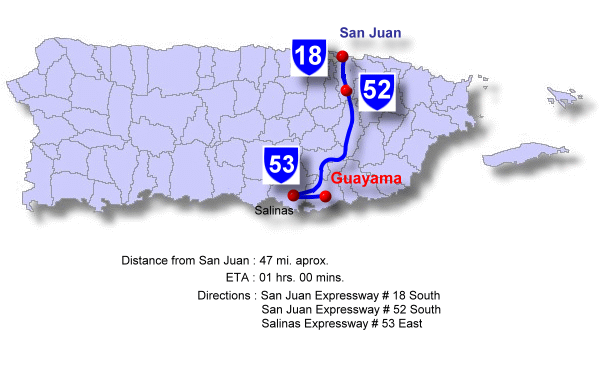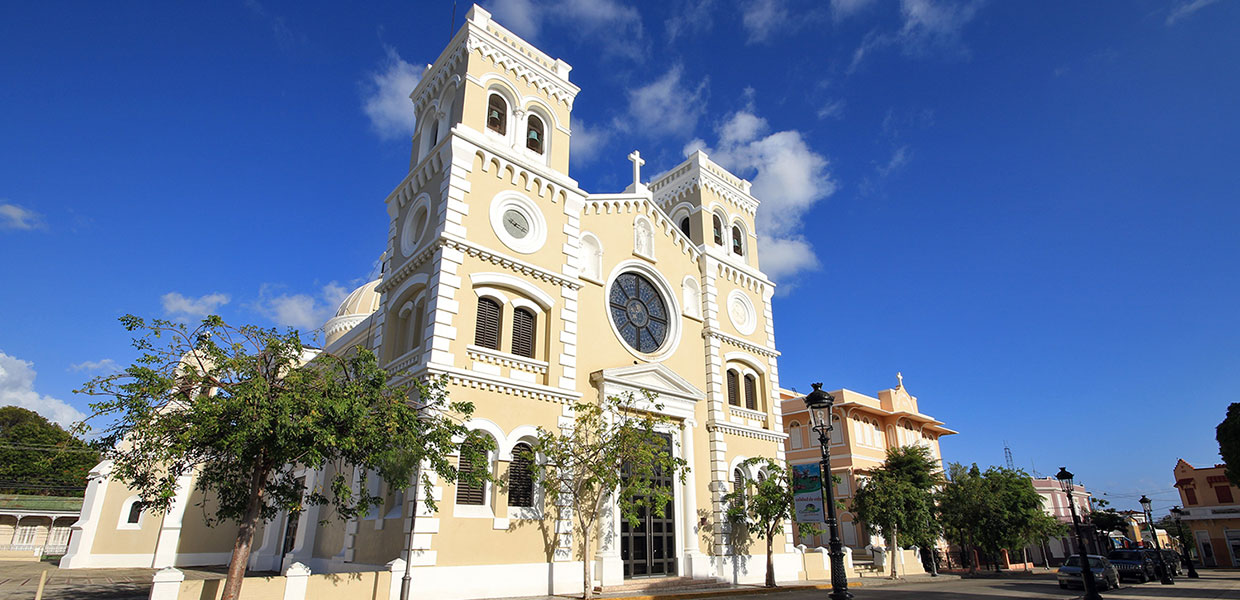
Guayama, Puerto Rico
Town of Wizards
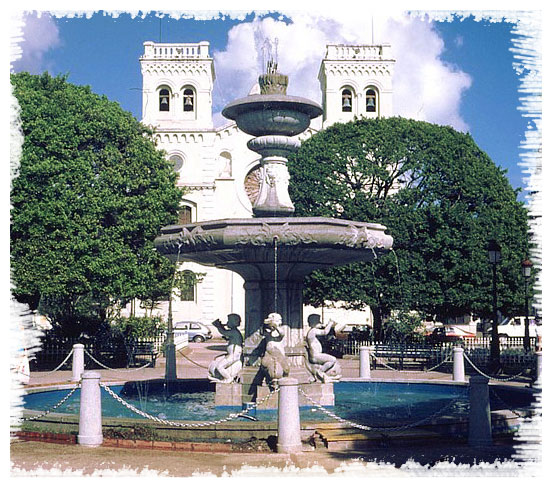
Guayama (gwah-YAH-mah) is known as the “Town of the Witches” and the “City of the Guamaní.” The patron saint of Guayama is Saint Anthony of Padua.
Guayama is bordered on the north by the municipality of Cayey, on the east by Patillas and Arroyo, on the south by the Caribbean Sea, and on the west by Salinas. Although it is part of the southern coastal plain, the Jájome range 2,395 feet high and Cayey range rise to the north of the municipality.
The highest points in Guayama are Cerro de la Tabla and Cerro Tumbado, which are part of the Cayey mountain range mentioned above. Other peaks in the municipality are Garau, Charcas and Peña Hendida.
By the middle of the 20th century, Guayama had achieved significant industrial development, including the arrival of the Univis Optical Corp., the Angela Manufacturing Company and the establishment of a petrochemical complex by the Philips Petroleum Company. In 1968, that company began production of paraffin, benzene, synthetic fibers, anhydrous plastic, a million gallons of gasoline daily and many other products.
In that same decade, a thermoelectric plant was built in Las Mareas sector. From that time, agriculture declined as a result of land lost to industrialization and the construction of urbanizations. The urban growth impacted the planting of sugar cane. As a result, 155,595 tones of cane were harvested in 1974, producing 12,655 tons of sugar.
Foundation:
Matías de Abadía founded Guayama in 1736. Its name is of Taino origin and derived from the region where Cacique Guanamí and Cacique Guayama lived, guayama means “great site”. The town is known as El Pueblo de los Brujos (Town of Wizards) in honor of “Moncho el Brujo” (Moncho the Wizard), a legendary baseball pitcher from Guayama.
In 1855, Arroyo was separated to become an independent municipality, taking the neighborhoods: Ancones, Arroyo, Yaurel, Pitajaya, and Cuatro Calles. By 1878, Guayama was a department head including: Comerío (then Sabana del Palmar), Cidra, Cayey, Salinas, Arroyo, San Lorenzo (then called Hato Grande), Aguas Buenas, Caguas, Gurabo, and Juncos.
The development continued with the construction of the town cemetery in 1844, the slaughterhouse and meat market in 1851, and a wooden theater of two levels in 1878. By then Guayama had fourteen sugar plantations operating with steam engines and three with ox mills.
Also practiced in this municipality was the exploitation of lead mines by the company “La Estrella”, owned by Miguel Planellas, as well as the mineral galena, by the company “La Rosita”, owned by Antonio Aponte.
In 1881, Guayama is declared a Villa (First Order Municipality).
Location:
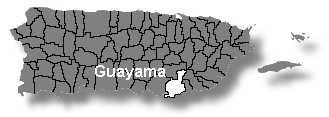 Located in the southern coast, its bordered by: Cayey to the north, the Caribbean Sea to the south, Salinas to the west, and Patillas and Arroyo to the east.
Located in the southern coast, its bordered by: Cayey to the north, the Caribbean Sea to the south, Salinas to the west, and Patillas and Arroyo to the east.
Area:
169.7 sq km / 65.3 sq mi
Population:
44,301 (census 2000)
Population Density:
261.0 per sq km / 678.4 per sq mi
People are known as:
Guayameses
Guayama is also known as:
El Pueblo de los Brujos (Town Of Wizards)
Ciudad Bruja (Wizard City)
La Ciudad del Guamaní (Guamaní City)
Wards: Guayama, Puerto Rico
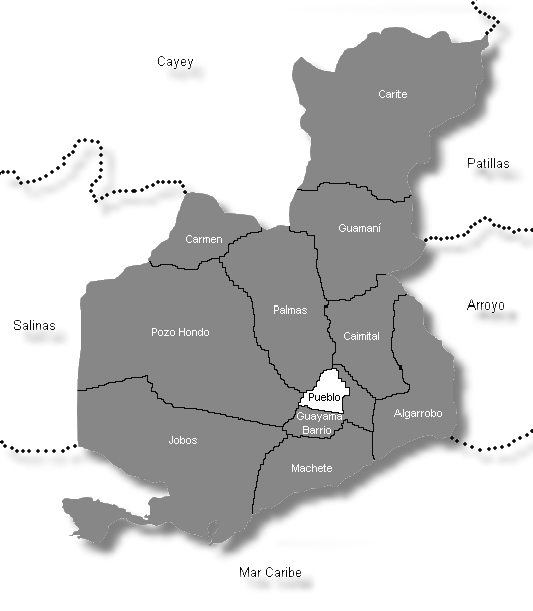
| Census 2000: Population by Wards – Guayama |
Habitants |
| Algarrobo | 7,377 |
| Caimital | 4,505 |
| Carite | 1,157 |
| Carmen | 682 |
| Guamaní | 1,528 |
| Guayama Pueblo | 17,111 |
| Jobos | 7,706 |
| Machete | 2,509 |
| Palmas | 841 |
| Pozo Hondo | 885 |
| Total | 44,301 |
Source: Censo 2000
Patron:
San Antonio de Padua
San Antonio de Padua Parish
Apartado 282
Guayama, P.R. 00785
(787) 864-4100
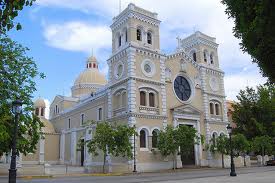
Topography:
Guayama pertenece, geográficamente, a la región de los Llanos Costaneros del Sur, por su parte norte corren las Sierras de Jájome y de Cayey.
Hydrography:
The hydrography is formed by the Plata, Chiquito, Guamaní and Seco rivers, and the Palmas Bajas, Culebra, Barros, Cimarrona, Salada, Corazón and Branderí gorges. The hydrographic system also includes the Carite Dam, Lake Melania and Las Mareas Lagoon near the coast.
Climate:
Annual precipitation is around 51.95 inches and its average temperature is 81°F.
Economy:
Manufacturing (pharmaceuticals, chemicals and petrochemicals), agriculture (sugar cane) and fishing.
Average Salary:
$344.93 weekly (1998)
Flag:
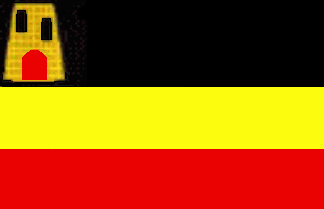 The Guayama flag is made up of three stripes of different colors. To the left of the top stripe we can see the Old Mill, which today is known as the Molino de Vives. Meaning of the colors:
The Guayama flag is made up of three stripes of different colors. To the left of the top stripe we can see the Old Mill, which today is known as the Molino de Vives. Meaning of the colors:
- Black – the African or black race of Puerto Rico.
- Yellow – the economic gain that generated the sugar cane in Puerto Rico.
- Red – the blood spilled by the enslaved Indians in the fights with foreign invasions.
Coat Of Arms:
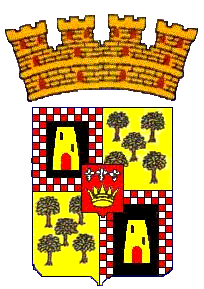 The shield is divided in four parts and in two of them part of a chessboard appears. This makes reference to the square and regular form of the Guayama urban zone. It has two old mill towers. These symbolize the sugar cane culture. They also represent the characteristic elements of the landscape and history of the town.
The shield is divided in four parts and in two of them part of a chessboard appears. This makes reference to the square and regular form of the Guayama urban zone. It has two old mill towers. These symbolize the sugar cane culture. They also represent the characteristic elements of the landscape and history of the town.
The laurel trees constitute a representation of the beautiful Recreation Plaza very well known for its trimmed trees. The three silver flowers symbolize San Antonio de Padua, patron of Guayama. The crown represents Cacique Guayama, name of the town. The branches with guava fruits surrounding the shield symbolize a legend related to the origins of the town: the appearance of San Antonio de Padua floating over a guava tree. The big crown has four towers that represent the municipal autonomy and the unity of the citizens in the defense of their historical traditions and common well-being. The crown means that Guayama obtained the title of Village.
Places To Visit:
- Bust of Luis Palés Matos
- Punta de las Figuras Lighthouse
- San Antonio de Padua Church
- Carite Lake
- Las Mareas
- Vives Mill
- Pozuelo Beach
- Rodeo Beach
Events:
- Witches Carnival – March
- Guayama Carnival – April
- Sweet Dreams Fair – March
- Paso Fino Fair – March
- Saint Anthony of Padua Patron Saint Festival – June
- Jíbaro Festival – October
- Puerto Rican Week – December
Distinguished Citizens:
- Luis Palés Matos – Poet. One of the founders of the Diepalismo Movement. Among his works are Azaleas, El Palacio en Sombras and Tuntún de Pasa y Grifería, among others.
- Catalino ‘Tite’ Curet Alonso – Musical composer. His songs were sung by many international figures, such as La Lupe, Celia Cruz and Ismael Miranda, among others.
- Eleuterio Derkes – (1836-1883) Poet, playwright, journalist and essayist.
- Luis Rivera – Pianist and composer specializing in religious music and awarded the gold medal in 1917 for his composition Ensueños.
- Francisco Porrata Doria – Architect. He designed the Old Bank of Ponce. among other historical buildings. He was mayor of Guayama 1933-1938.
- Vicente Palés Anés – Father of Luis Palés Matos and patriarch of a family of poets. He contributed to periodicals of his era. He published two small books of verse: A la masonería (1886) and El cementerio (1889).
Public Schools sorted by educational levels.
Caguas Region
Guayama District
| Name | Level | Telephone | Address |
| Elementary | |||
| ALEJANDRO ORTÍZ RESTO | K-4 | (787) 864-6413 | PO Box 2219, P.R. 00785-0000 |
| AMALIA MARÍN | K-6 | (787) 864-1068 | PO Box 2368, P.R. 00785-0000 |
| ANSELMO VÁZQUEZ DE JESÚS | K-4 | (787) 853-2002 | PO Box 2219, P.R. 00785-0000 |
| BARTOLO CAUSSADE GONZÁLEZ | K-6 | (787) 866-0367 | PO Box 1979, P.R. 00785-0000 |
| CARLOS MARTÍNEZ BENÍTEZ | K-6 | (787) 866-0373 | PO Box 90, P.R. 00785-0000 |
| FRANCISCO NAVARRO COLÓN | K-6 | (787) 866-0779 | PO Box 449, P.R. 00785-9707 |
| JORGE WASHINGTON II | 3-6 | (787) 864-1268 | PO Box 57, P.R. 00785-0000 |
| JOSÉ MUÑOZ VÁZQUEZ | K-6 | (787) 864-4919 | PO Box 90, P.R. 00785-0000 |
| LUIS MUÑOZ RIVERA | K-2 | (787) 864-1015 | PO Box 90, P.R. 00785-0000 |
| LUIS PALÉS MATOS | K-6 | (787) 864-2101 | PO Box 2280, P.R. 00785-0000 |
| MARCELA GARCÍA CORA | K-6 | (787) 864-7374 | PO Box 2219, P.R. 00785-0000 |
| OLIMPO | K-6 | (787) 864-3875 | PO Box 90, P.R. 00785-0000 |
| OSCAR HERNÁNDEZ GUEVARA | K-6 | (787) 864-8242 | PO Box 2370, P.R. 00785-0000 |
| VICENTE PALÉS ANÉS | K-6 | (787) 864-0866 | PO Box 90, P.R. 00785-0000 |
| WASHINGTON I | PK-2 | (787) 864-0566 | PO Box 10007 Suite 121, P.R. 00785-0000 |
| Intermediate | |||
| GENARO CAUTIÑO | 7 | (787) 864-0668 | PO Box 90, P.R. 00785-0000 |
| LUIS A RIVERA | 8-9 | (787) 864-0968 | PO Box 90, P.R. 00785-0000 |
| SIMÓN MADERA | 7-9 | (787) 864-0768 | PO Box 10007 Suite 102, P.R. 00785-0000 |
| PS – Institute | |||
| INSTITUTO TECNOLÓGICO | 13-14 | (787) 864-0354 | PO Box 150, P.R. 00785-0000 |
| Otros | |||
| ELEUTERIO LUGO | ADULTOS | (787) 864-3959 | PO Box 90, P.R. 00785-0000 |
| RAMÓN ÁVILA (TECH. VOC.) | ADULTOS | (787) 864-0413 | PO Box 150, P.R. 00785-0000 |
| Secondary | |||
| ADELA BRENES TEXIDOR | 7-12 | (787) 864-7700 | PO Box 2188, P.R. 00785-0000 |
| FRANCISCO GARCÍA BOYRIE | 7-12 | (787) 864-3879 | PO Box 10016, P.R. 00785-0000 |
| SU JUAN ALEMAÑY SILVA | K-9 | (787) 864-3005 | PO Box 90, P.R. 00785-0000 |
| High School | |||
| ANTONIO LUCHETTI | EE | (787) 864-2202 | PO Box 90, P.R. 00785-0000 |
| DR. RAFAEL LÓPEZ LANDRÓN | 10-12 | (787) 864-4366 | PO Box 90, P.R. 00785-0000 |
Hymn:
By Néstor Cora Vera
¡Viva Guayama, mi pueblo idolatrado,
la bella patria chica donde nací!
Siempre recuerdo tu nombre venerado.
En mis angustias acuérdate de mí.
¡Viva Derkes, que viva Palés Matos,
grandes hombre de nuestro patrio lar!
Su recuerdo es muy grato
y a Guayama le vamos a cantar.
Recordemos, recordemos
a Guayama, con amor.
Recordemos, recordemos
a Guayama, con amor
son tus mujeres, cual ninfas escapadas.

